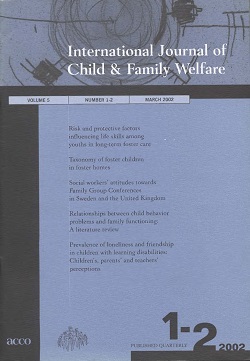Risk and protective factors influencing life skills among youths in long-term foster care
Keywords:
resiliency, risk factors, protective factors, self-sufficiencyAbstract
This article examines the predictive value of selected risk and protective factors in explaining self-sufficiency skills of youths in long-term foster care. The sample included 219 ethnically diverse youths (133 females and 86 males) in care and their caregivers. The average age of the youths was 13.96 years. This study measured life skills with the Ansell-Casey Life Skills Assessment, completed independently by youths and caregivers, as well as a survey of social workers to gather additional information about the incidence of specific risk and protective factors. Protective factors were associated with greater self-sufficiency skills and risk factors were negatively associated. Using stepwise regression, for caregivers, risk and protective factors in a linear combination, explained more variance of the skill areas of Decision-Making, Social Relationships and Money Management than when considered in separate regression analyses. The reverse was true for these areas rated by youths. Practice and research implications are discussed.

